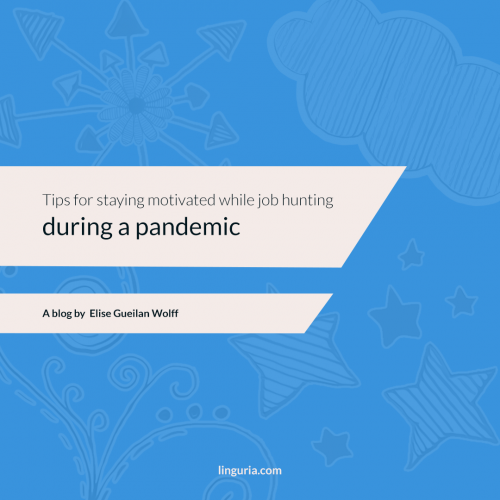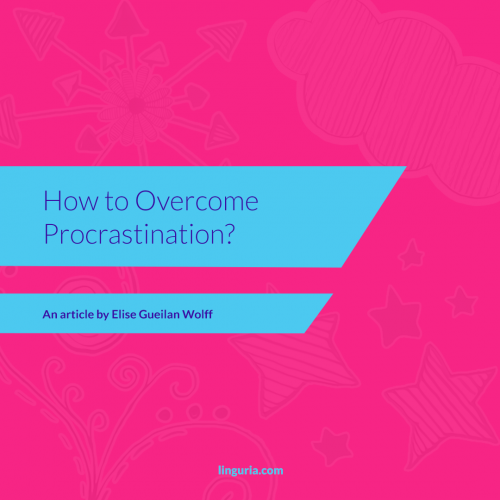Starting out is never easy. Thankfully, there are many ways at hand to build up your résumé and boost your career. Here are a few tips you could easily implement in your daily life:
- § Work on your skill set: take on an online marketing class on Coursera, read non-fiction, listen to a podcast episode in your native AND second language. These can be focused on translation (e.g. “Smart Habits for Translators”, “Speaking of Translation”, “Squiggly Careers”), but you could also simply listen to a discussion about a topic you are personally interested in.
- § Volunteer at an organisation that will allow you to implement both your soft and hard skills e.g. Translators Without Borders, or work on your writing skills by creating a blog or doing proofreading work.
- § Dive back into Ancient Greek or other languages you’ve half-learned in school or start anew and study a (rare) language. This will increase your value on the market and show that you have an authentic and long-lasting curiosity for other languages and cultures.
- § Find your niche – not necessarily what you‘re passionate about! – and become an expert in that field.
- § BUT don’t stay in your lane; remain curious about other industries and keep an open mind. Professional development isn’t a linear process. 😊
- § Create yourself a network by reaching out to fellow translators and linguists on LinkedIn, join translator groups on Facebook, ideally try to find a mentor who will guide you professionally and give you previous advice.
- § And maybe the most important step of all: sit down and create your own website. This will put your name out there and market yourself much better than a mere CV. There are many free softwares such as wordpress that are very user-friendly and will give you a decent result. It might also be worth hiring a professional web designer as this will be a good investment in the long-term.
Dedicate a few hours a week to specifically work on these goals and you should see progress and notice a change for the better in no time!
If you have recently graduated, chances are you are currently spending your days more or less relentlessly browsing job search websites. Here are a few tips to help you not despair and end up a young, grumpy misanthrope.
First, do bear in mind: your first job does not have to be THE perfect job - you are not signing on a job for life! For now, it is all about gaining valuable experience and getting a foot in the door. It would however be good if you were somewhat aligned with the values of the translation agencies you are applying to.
Also, don’t take rejections personally and don’t let them shatter your self-confidence. You hold a degree and have years of studying behind you and know so much more than you give yourself credit for. So stand tall :)
An easy way to make the writing applications process more “fun” (I may or may not be stretching the definition of ‘fun’ here a bit) is to do it whilst listening to your favourite album or a good podcast. If you still feel that you are slowly getting frustrated with the world, take a break from your laptop, go for a walk, treat yourself to a creamy hot chocolate, or ring a friend and vent away. I for example have set the rule for myself to spend the day out whenever the sun shines and only go on my laptop once it is dark outside, which seems quite reasonable in winter times. When every day just seems the same, it can also be helpful to allocate fixed hours to your job search e.g. 9am-5pm to maintain some semblance of normalcy.
And most importantly, remember; we are in the midst of a pandemic and the job market is very tight, so it is more than okay not to be employed straight out of university and struggle to find work. In the words of A. L. Williams: All You Can Do Is All You Can Do, But All You Can Do Is Enough!
Elise G. Wolff
- Determine whether you want to do a PhD afterwards (in which case it would be better to do an MA in Translation Studies from a research-oriented university) or would rather get a lot of translation practice and/or experience in both translation and interpretation (if this is the case, go for a hands-on degree e.g. Applied Translation Studies from Leeds, Exeter, Manchester or East Anglia).
- If you already have an idea of the kind of translation you would like to focus on, check out which professors are specialised in your area and choose the university they teach at.
- Do NOT choose a university depending on a ranking - these often do not apply to the MLAC department or even the translation study field. But do check out reviews previous students have left.
- Figure out what really motivates you and don't choose a degree just because "it will look good on your CV". Experience looks good on CVs too ;)
- There's no need to rush through your MA; it is okay if you would rather do it part-time to have the opportunity to do projects on the side or get a part-time job. It is not a race and MA are quite onerous, so take your time and really get into it.
- It is important to also consider where you would want to work after your MA. In many European countries, you'd be expected to hold an MA whilst it is optional in the UK.
Working as a freelance translator or, as many of us have had to recently for all too obvious reasons, from home, can have its challenges. There are always other things that seem to be much more interesting than finishing translating that instruction manual for vacuum cleaners.
Here are some tips to overcome that urge to spring clean your whole wardrobe or finally keep up your correspondence. First of all, it is very important that your desk(top) and work area are tidy and clean. Make sure to remove all temptations such as phones and clutter and close these tabs. If you are into plants, you can also put one on your desk to visually brighten up your workspace.
Once you have eliminated these external distractions, move onto core strategies. You should figure out when you are the most productive: there is no point in trying to get that text done by midnight if you are a morning person. Set yourself daily goals and be consequent about it. If you did not meet your 500-word target, don’t curl up in front of your favourite TV show tonight. And do check out popular time-management techniques. The Pomodoro technique for example does not only have a cute name reminiscent of Pokémon but also allows you to work in small 25-minute chunks and reward yourself with 5 to 15-minute breaks. Take this time to rest your eyes from the screen and get yourself a well-deserved snack or a nice cuppa.








Or, procrastinate about reading articles about procrastination and get your work done, instead.
Indeed! :)
Always! My best option... Actually, I was procrastinating on Instagram and saw the post about this article thanks to Linguria's account. Then I thought, "Oh! I should go and procrastinate there as well". 😇
Ooh lovely! :) Totally, the procrastination vortex can be really comfy!